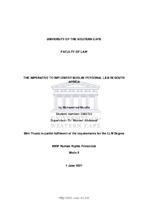The imperative to implement Muslim personal law in South Africa
Abstract
It has been more than 25 years since the Interim Constitution came into effect and a
Bill of Rights was introduced. Yet Muslim Personal Law ( still has no lega l
recognition in South Africa. This the sis investigates how this causes serious
problems for Muslim women who suffer grave injustices upo n divorce due to the non
recognition and non regulati on of Muslim marriages It highlights t he State refus al to
enact legislation despite the dicta and obiter comments from the courts spanning
more than two decad es enjoining the state to effect legislation to achieve this
purpose. South African law is still fundamentally lacking in the recognition of the
rights of parties to marriages contracted only in terms of M PL . For couples married in
accordance with civil law, marriages and divorces are dealt with under the relevant
statutes, namely the Marriage Act 25 of 1961, t he Civil Union Act 17 of 2006 and the
Divorce Act 70 of 1979. No provision has been made in statu tor y law for MP L .
Previously the courts have held that this was due to the potentially polygyn ous
nature of Muslim marriages. Muslim m arriages are inadequately regulated resulting
in serious hardships to Muslim women and children. This thesis furthermore
inve stigate s the need to recognize MPL .

